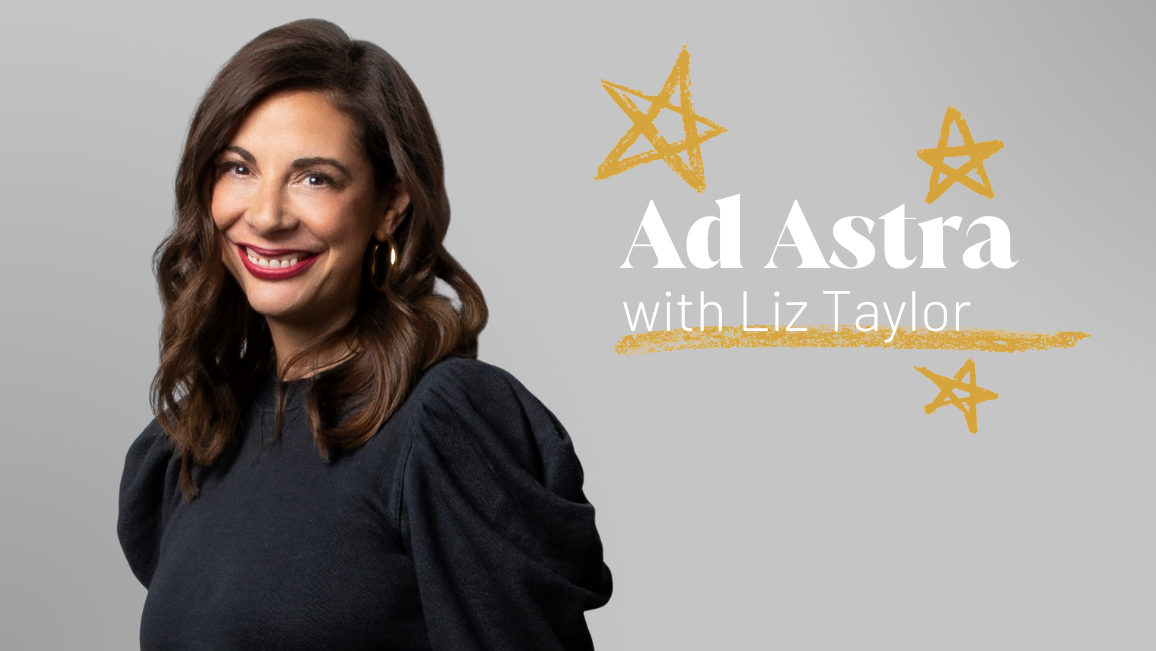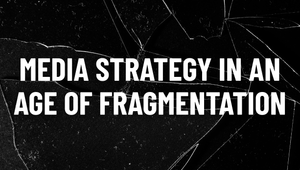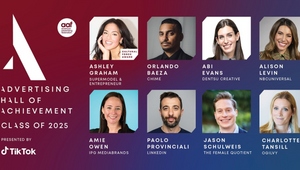
Ad Astra: Reading the Cards with Liz Taylor

“Two things I think all creatives should do: improv classes and learn to play poker,” declares Liz Taylor. It’s a statement that gives you an immediate taste of the duality of Ogilvy’s global chief creative officer. Liz the poker player is still, observant, decisive, constantly calculating risk versus reward, and in control of the story she’s telling. Liz the improvisation comic crackles with warmth, humour, curiosity and the spirit of ‘relentless collaboration’. There's also Liz the reader - but we'll come to her later.
Appropriately enough, we meet in Las Vegas, where Liz is judging at the London International Awards - and fitting in a couple of hands of Texas Hold ‘em. She’s been into cards ever since she was a teenager when her mother would host a poker game with her girl pals, filling the house with snacks and laughter. Throughout her career she’s managed to keep her hand in, with one or two regular games on the go - at one point she had three - and she’s convinced that it has shaped the creative leader hse has become.
“Being a creative leader makes me a better poker player, and being a poker player makes me a better leader,” says Liz. She warms up to a favourite topic of hers - and one that she’s even presented to the WPP leadership.
“One, you have to read the room. You don’t know these people you’re sitting down with. So it works for pitches really well. You have to watch body language and behaviours. Are they leaning in? Am I losing people?
“And poker is a storytelling game. I may have the worst hand, but I’ve got to get everybody in that room to buy what I’m selling. Also, you don’t have all the information. So I think it teaches decision making, right? I have my cards, I have a few of the cards out there. I have body language from people. We have to make so many decisions every day. I think the best creative leaders are decisive and give clear feedback.”
The card table has proven to be an excellent training ground when it comes to developing a sense of self-possession. Liz reflects that poker is not won hand-by-hand, but rather it’s a marathon. Those who let a lost hand rattle and frustrate them are, she says, ‘on tilt’ and start making bad decisions. It’s not dissimilar to creatives who let one lost pitch or one exciting new technology sweep them away. “You’ve got to stay centred. In poker, I’ve got to be me in the moment and not go with highs and lows. I tell a lot of creatives, we’re super emotional. We’re so attached. But if I’m in a presentation and everybody’s giving me negative feedback, I’ve got to lean in.”
The wisecracking comedian also emerged from Liz’s youth. As a self-described ‘theatre kid’, Liz fell into the role of the funny kid rather than aspiring leading lady as she used humour to process her ‘dysfunctional’ family life. She grew up in Chicago to a Jewish family in a neighbourhood that was used to shoot John Hughes movies. And Chicago was also home of The Second City, the famous improvisational comedy troupe and SNL nursery slope, it was inevitable Liz would find her way to improv, where she spent three years developing her ‘yes, and’ muscle.
“Improv isn’t stand up. It’s not a one-person show, right? And in our industry, nobody will succeed if it’s a one-person show. It is relentless collaboration,” says Liz. She learned about the power of building up ideas rather than knocking them down, not to mention becoming a master of spontaneity.
“The thing with improv is that we have to think on our feet in any meeting or interview. It’s like whack-a-mole! What’s happening over there? OK, let me respond…” she says, acting it out. "It’s a team sport. I’m going to set you up for the best line. You’re going in there, I’m going to give you that little lob and you’re going to bring it home - and we all win.”
Before she was a poker shark and improv player, however, Liz was a reader and a writer. At 12 years old, she wrote her first book, which won several awards. She would read voraciously - and still averages a book a week. (Liz describes reading as her equivalent of Headspace.) So creativity and writing in particular was always important to Liz - though when she went to college to study English, she had it in her mind that she would follow her older brother into law.
Her brother, however, could tell a bad idea when he saw one. She was all set to to go law school at UCLA when he pulled her aside and said, “What the fuck are you doing?” Liz says that her brother could see that she had fallen in love with the theatricality of the courtroom monologues in TV shows like LA law. By contrast, he could see that it would ‘suck every ounce of creativity’ out of Liz, and he begged her to think of something else.
That was that. The very next day, Liz decided to cold call Chicago’s most famous advertising agency, Leo Burnett. She knew she liked advertising - where her friends had put up posters of bands and movies, Liz’s college dorm had been plastered with Nike ads - but had no idea where to start. So she simply asked the lady on reception, ‘How do I get a job making ads?’. That kind soul passed Liz onto the creative department, who told her to swing by for the portfolio night the following evening.
“I thought it was an interview. I go out and buy a suit - because nobody tells you anything! And I walk into Leo Burnett and it was like the clouds parted and the heavens came down. I was like, ‘I am with my people!’,” says Liz. At the portfolio night, many of the students had created posters for their ad schools, in response to a competition The One Show had put out - and the ads for the Portfolio Center in Atlanta caught her eye.
“I went home, told my mom, my greatest champion. I call and find out that it’s as much as law school only you don’t get a degree. My mom’s like, you gotta do it. And the rest was history. I went to ad school and the next time I walked into Leo Burnett I was the global CCO.”
Liz reflects ruefully that in the haste of youth she had neglected to find out the name of the receptionist at Leo’s who had decided not to hang up the phone on her. As thanks, then, she makes a point of trying to pay that kindness forward instead.
In Atlanta, Liz met her husband and her mind was opened to the inner workings of the advertising world. At a time when her fellow students were clamouring to get jobs at ultra-cool boutiques, when going to big agencies was seen as selling out, Liz found herself drawn to the possibilities and scale of major networks. And so she ended up moving to JWT.
“I felt like that big agency wanted me so bad,” she says. “I felt so embraced. When I interviewed with anyone I felt like we were both feeling like we might have won the lottery, so my first advice was ‘go where you’re loved, go where they want you’. That was one lesson. Go where you’re wanted because of the great opportunities. I had the best champions and people gave me the best opportunities when I was there.”
At JWT, Liz learned a major creative lesson, that would influence her understanding of the way tension and diversity can elevate creativity. At the agency she was paired with art director Thomas Hayo. German, achingly cool, plugged into the hippest bands and favouring visual storytelling, Thomas felt like everything Liz, a ‘Midwestern sorority girl’, whose default was Seinfeld-y dialogue, was not. Once the pair got over their initial awkwardness and found a way to harness their clashing styles there was no stopping them.
“It took us a little bit… and then it was fucking magic! Because we had this language of creativity. I mean, he spoke English obviously, but our backgrounds are so different. So we had to find ways to come up with ideas that we both believed in. I really think that shaped me a lot, I definitely think my storytelling improved. It wasn’t always about just getting a joke.”
That idea that there’s a universal language of creativity that transcends culture is core to how Liz approaches her role as a global chief creative officer. She really puts an emphasis on that global part, bringing together her global creative council every Tuesday.
There are just a handful of global chief creative officers around the world that, really, each person has to define that role for themselves. Liz has a single north star. “People always ask me, what is a global CCO. It’s hard to put that into words, but I do think I have one job and it is to get rid of the obstacles, to make people’s job easier.”
In practice, that means creating an environment where people feel safe to fail, feel supported to take risks and where collaboration and openness are constant. Part of that means getting people comfortable with sharing work in its raw state.
“It goes back to the improv of relentless collaboration. I don’t like when creatives hide in their offices. I like boards out, and the work everywhere - in progress - so people can walk by it and add to it, build and comment, find a flaw, and say, ‘that part feels a little wonky’. That makes people uncomfortable, being vulnerable,” explains Liz. “I’m not sure how other CCOs work globally or locally, but in my past you couldn’t present something to someone unless it was buttoned up. I like being in the mess. I don’t ever want someone to feel uncomfortable or nervous or that it has to be perfect. Also, if it’s so perfect and you have to give feedback it’s much harder. It’s like a child to them.”
Another major part of Liz’s role is, of course, working with clients to bring them along on that iterative, creative journey.
“I love our client relationships. We have a three-phrase mantra, which is: do the right thing, do the best work of your life and do it together,” says Liz, explaining that ‘do it together’ very much includes clients. “We have to be in it together. We have to win together, and lose together. I think that the better relationship you have with a client, the more open they are and more transparent they are with their problems that are keeping them up at night. The thing I ask every client anytime I’m meeting with them is ‘ give us your big hairy problem’. THAT’S where the best work comes.”
For creatives, that means caring deeply about clients’ business. Liz advises creatives to understand not just their client’s business, but their competitors’ business. “You need to teach them to think outside of their business. Who are the competitors they’re not thinking about? You need to see what they’re posting on LinkedIn because that’s what’s important to them. I think that’s how you earn trust and then, once you earn trust, it gets easier to sell the work because they know I have their best interests at heart,” says Liz.
Each client has its own relationship with creativity too. For some, says Liz, it’s her job to educate and explain how creativity works and what good work looks like. Others, however, are so immersed in creativity that they inspire the agency. Liz cites Mondelez as a prime example. The multi-award-winning ‘Shah Rukh Khan My Ad’ for Cadbury’s took the biggest Bollywood star in the world and used AI to turn him into a spokesperson for every mom-and-pop business that wanted him, and not just businesses that sold Cadbury. It's the sort of idea that sounds wild and unachievable until you do it. “You can hear all of the ‘no’s that could have happened. Mondelez is off the chart,” she says, praising Mondelez for their vision, openness and understanding of the business impact of creativity..
As much as Liz cares about her clients and their business, though, she doesn’t have that all-too-common ad industry tunnel vision. She cares deeply about society and the wider world too. And that passion is something she shares with her opposite number, Devika Bulchandani, Ogilvy’s global CEO. It’s a stellar partnership (“she is amazing, I won the lottery,” enthuses Liz) and together the pair aim to change three laws or policies a year.
“Devika is very passionate about policy. Our thing is to drive real impact. Impact the business, impact people’s lives,” says Liz. It started, she explains, with Dove and the CROWN Act, a campaign to make it illegal to discriminate on the basis of hair in the USA. In many states, businesses and schools can still discriminate against African American women by targeting their natural hair. “We worked with Dove on that and 24 states and counting have passed it. We don’t do it alone and I also think brands are more empowered than government sometimes to put pressure on change.”
The pair scrutinise their clients’ brand purposes to find where business goals and legal and social change align. Currently, for example, Ogilvy is working with Dove on an online safety piece of policy. Another campaign that had a huge influence on the law was the Morning After Island. In Honduras, where the morning after pill was illegal, women could be jailed for taking a pill that’s available over the counter in the USA. The team discovered a loophole, whereby the law did not exist in international waters, so they created a floating raft where women could sail out to. The project created so much buzz that after a year and a half, the government of Honduras changed the law. They also sent Liz and Devika an official seal, thanking Ogilvy for playing their part.
With such lofty ambitions, the scale and diversity of Ogilvy is crucial. It’s all about being able to harness experts in PR, technology and behavioural science and bring that into the creative swirl.
“There’s so much now. There’s TikTok, there’s AI, there’s so much that no one person can do it all,” says Liz. “You need to be a curious sponge and know enough to be dangerous, but you bring in that person who is either obsessed or an expert and you bring everyone to the table. And then we all do better. It’s why I love working in such a big organisation. Some people like the same… I kind of like the big because there is so much talent to bring together.”
When it comes to technology, that poker player and the improv comic come back into focus. The poker player is clear-eyed, assessing the opportunities and refusing to be swept headlessly into a trend or buzzword. The improviser asks, how can we build on this?
“Originally, I thought the greatest thing about AI was taking away the mundane; the kind of things that people hate doing, AI can do. But if you stop there, you’re kind of missing out,” says Liz, yes-and-ing.
“I think the best anyone can do in our industry now is to be a curious soul. And if you think anything’s the death of something, you’re not really curious,” says Liz. She likes technology when it’s ‘invisible’ and creates magic for the consumer. The Shah Rukh Khan campaign is one that couldn’t have happened without artificial intelligence or highly-targeted media - but in the end it was the delightful idea and sense of fun that won out.”
That technology allows Liz and her team across Ogilvy to a make huge, unignorable impact on the world. But what you might not know is that she also has an influence in a small, very human and intimate way that owes more to the reader than the poker champ or theatre kid. Every week she works her way through a book - she is still the very embodiment of that old Dorothy Parker phrase the ‘constant reader. Liz’s preferred genre is what she calls the ‘dysfunctional memoir’ and she devours them as she travels between Ogilvy offices or tries to unwind before sleep’. Being able to immerse herself in someone else’s hero’s journey brings her calm and brings her insight and brings her reassurance.
“I don’t keep the books that I read. I can’t do an electronic Kindle, I have to have the actual book. So I write a note and I will leave them somewhere when I finish, whether it’s an airport or a hotel or coffee shop. Someone’s gonna find that, hopefully pick it up and read it,” she reveals. “I guess it’s spreading my love… infiltrating the world with readers…”
It's a human scale act of kindness. But more than that, it's a reminder that, whether you come face-to-face with Liz in a pitch or at the card table, all she really wants to do is share a story.















